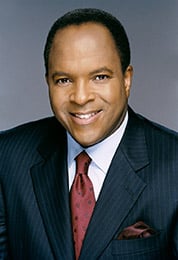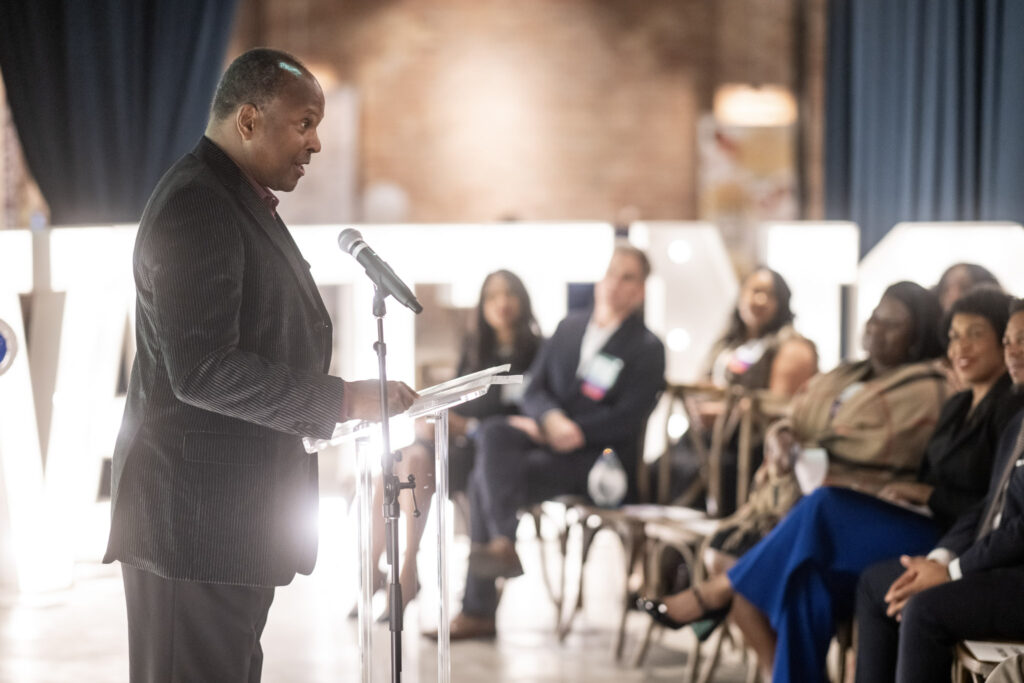This newsletter was sent to our Saint Leonard’s community email subscribers on April 10, 2025. If you would like to receive future news from Saint Leonard’s, join us and subscribe to receive email updates.
|
For four decades, he was the face and voice of television-news broadcasts that covered Chicago and the world. He now volunteers at Saint Leonard’s Ministries, assisting with development goals and providing employment guidance to participants in our Road to Success program.  “I really enjoy it because it introduces me to the clients who are coming through,” Blakley says about his time on campus. “I’ve had very interesting conversations with many of them outside of the classroom. They’ll see me in the hall, stop and ask me something about the material I presented. I view this as an opportunity to pay back, give forward.” When Derrick Blakley meets with participants in our workforce-prep program, he talks about customer service. “When a customer is interacting with you, you’re the company,” he says. “Whether the company is Amazon, McDonald’s, a multi-billion-dollar corporation or a mom-and-pop, you’re representing the company. You have a very important role to play.” Blakley would know. A Chicago native, Blakley grew up near 87th Street and Cottage Grove Avenue to parents who moved from the South after World War II. His parents met while working at the Western Electric plant that made all the equipment needed for telephones. “They didn’t make a whole lot of money, but they were union members. It was very steady work. They bought phone company stock and were able to buy a house. It was a very comfortable way to grow up,” he says. “I had everything I needed and some of what I wanted. It’s not going to get any better than that.” While attending Hales Franciscan High School, he earned a scholarship to Columbia University. He boarded an airplane for the first time and headed to New York but eventually decided to pursue a degree in journalism. Columbia didn’t offer that major, so he returned home to attend Northwestern University. Blakley landed an internship at the Chicago Tribune and was hired there full time in 1976 after he finished graduate school at the University of Illinois. He spent two years at the newspaper and his move to television news happened when he was recruited for a broadcasting job in Columbus, Ohio. “He hired me with no TV experience to do TV,” he recalls. “And it was one of many lucky breaks that I had.” The station’s 10 p.m. broadcast garnered a 50 percent share, which meant half of the viewers in the market were watching. The station had a helicopter and a staff pilot, so Blakley could travel the region to cover stories in nearby Pittsburgh and Cleveland. In 1980, he joined CBS News as a correspondent covering the Midwest. Three years later, he accepted an overseas transfer to London. “My son was born there, and we wound up in this wonderful international city and the center of a whole different English-speaking world,” he says. After two years, he was transferred again – this time, to a divided Germany in the western city of Bonn. When the bureau closed in 1987, Blakley returned to Chicago to work at NBC-5 for 16 years. He then worked at CBS-2 for another 16 years before retiring in 2020. Reflecting on his time as a professional storyteller and observer, Blakley recalls three news events that stand out: the famine in Ethiopia; reporting on the St. Louis visit of Pope John Paul II; and the death of Chicago Mayor Harold Washington. Regarding his time in Ethiopia and the thousands of people in various stages of starvation, Blakley says “it emphasized how much injustice there is in the world. And the various kinds of inequality that exist in the world. And I guess that we have a responsibility to do what we can even if it’s in a very small way to mitigate that, to work against that. Even in a small way. A way that might seem small to us but could have a very large impact on someone’s very life.” “When I went home, I had an infant son and especially seeing those kids who were not going to make it, it pressed on me how fortunate I was. And again, that we all have a responsibility to do what we can to make the world a bit less unjust.” The event in St. Louis reinforced the enormous influence of the Pope. “Because you had the pilgrims coming from all over the country to St. Louis for his visit. And in a sense, the Pope is a kind of blank slate, and people project onto him their own personal feelings. And they make of him what they want him to be, to a certain extent. But that doesn’t diminish his influence.” Blakley remembers wondering how Mass would be held for tens of thousands of people in a football stadium. “They had more priests there than I had ever seen in my life,” he says. “The priests fanned out throughout the stadium carrying yellow umbrellas with the papal seal, and that was where the Eucharist was going to be distributed. It’s the Vatican, so they know how to do this. And it was just amazing, the logistics of that was amazing. So that was an impressive thing to witness.” Covering the passing of Mayor Washington in 1987, Blakley remembers City Hall being open around the clock for people to pay their respects to “a historic figure as a politician and as a personality that really touched people’s hearts.” “And that grief was a recognition of the profound effect he had on Chicago and Chicagoans,” he says. Blakley, who became a Catholic as a teenager, said his volunteer time on Saint Leonard’s campus is an extension of Jesus’ teachings. “People coming out of incarceration are damaged by the experience. You lock someone in a cage for years on end, and it has an effect. And it’s not a positive effect, obviously. So just for those reasons, they are deserving of support,” he says. “And as a citizen, we all benefit because as we know, the recidivism rate for Saint Leonard’s graduates is very low.” Asked what he has learned since he joined the Saint Leonard’s community last year, Blakley says “the potential that these men and women have is incredible.” “I’ve learned that they have an incredible amount of inherent intelligence and ingenuity,” he says. “And I’ve learned that what they perhaps need most is for other people to show belief in them.” Thank you, Derrick Blakley, for joining this community and contributing to the future of our community and organization. |

